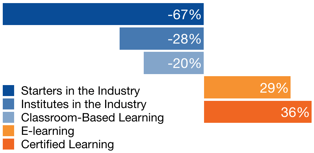During the Great Recession, friends of mine in the financial industry told me: “We didn’t realise the whole system was rotten, we were slap bang in the middle of it, so how could we?” And now I wonder, could the same be true for the training industry?
I have been involved in corporate training for some 25 years, and especially since the end of the Great Recession I have witnessed many fundamental changes. But … rather than sharing my subjective opinion with you, I thought it might be helpful to summarise a very comprehensive report on the training industry in North Western Europe. More than 300 private sector training institutes were interviewed in 2018. The comprehensive 60 page report covered the changes in the sector between 2010 and 2017. Below you’ll find an overview (in no particular order) of five impelling trends in the industry.
1. Market Doesn’t Grow
Based on my long experience in the industry, I expected double digit growth following the Great Recession. Investment in corporate training is cyclical by nature. It’s very much Last In, First Out. When the recession hits, cutbacks in training are made almost immediately. And when the economy improves, it’s one of the last sectors to feel the effect of same. It was always thus.
In 2010 we were pretty much at the bottom of the economic cycle. The economy started to improve afterwards but by 2014, total turnover in the sector had only increased by a mere 6%. But hey, since 2014 the economy has been firing on all cylinders, so surely it has grown massively since? No such luck, between 2014 and the end of 2017 the sector did not grow at all! How come?
2. Digital Transformation
Classroom-based training keeps decreasing in importance. In 2010, half of all training took place in a traditional classroom-based setting. By 2017, it had decreased by 20%. Over the same time period, e-learning and blended learning had increased by 29%. The trend is obvious.
An increasing number of clients are asking us for online solutions. The reasons are typically financial (it’s much cheaper), it’s faster to implement and scale up, and millennials expect it. Traditional training institutes usually can’t deliver state-of-the-art learning solutions and suffer as a consequence.
3. Internationalisation
In my humble opinion, those advocating a ‘local-only’ approach are fighting a losing battle. Thousands of students are taking part in Erasmus exchange programmes, schools might have children with dozens of different nationalities and many organisations couldn’t function without e.g. web developers or digital marketeers from around the world.
We find that for instance our clients in the financial sector are looking for international solutions. In view of the above, isn’t it odd that consistently more than 80% of the training institutes only have a local presence and provide learning only in their own language?
4. Shake-Out
A huge shake-out has been taken place since the Great Recession. Since 2010, 28% of training institutes have left the market. These were primarily smaller institutes with fewer than 10 employees.
The number of starters in the industry has gone down sharply as well. Training institutes founded within the last five years is down 67%! That can’t be good for innovation.
Whereas independent contractors collected more than 30% of money spend on training in 2010, this percentage came down to 11% in 2017. Explanations might for instance be that buyers do not want the hassle of dealing with many different individuals, or that independent contractors are not able to provide the type of scaled-up services clients require.
5. Certification
Certification is becoming more important. Between 2010 and 2017 the demand for certified professional learning increased by 36%. At the same time, the demand for formal third level education programmes decreased by 44%. The latter is noticeable, because the non-private training institutes saw no such decrease.
The increase in the demand for certified professional learning is certainly reflected in our portfolio. Recent graduates and even those already in the workplace for many years, require up-skilling in order to cope with digital transformation. And employers paying for the education appreciate the certification process as well, because it provides participants with great intrinsic motivation to finish the course.

Would you like to ‘talk’ to me about the above five trends in the training industry? Or anything else I can help you with? Then please do reach out to me….
Want to know more about digital marketing training or code training for you or your organisation?


